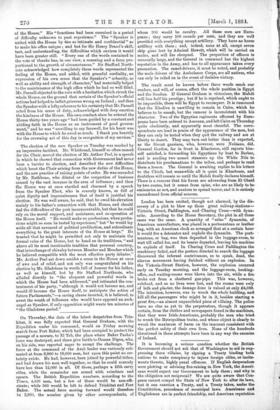The election of the new Speaker on Tuesday was marked
by an impressive incident. Mr. Whitbread, himself so often named for the Chair, moved the election of Mr. Arthur Peel, in a speech in which he showed that connection with Government had never been a barrier to election, and described the new difficulties which beset the Chair arising from the new duties of the House, and the new practice of raising points of order. He was seconded by Mr. Rathbone, who dilated or the congestion of business caused by the vast increase in the area of influence ; and then the House was at once startled and charmed by a speech from the Speaker Elect, who is scarcely known, so full of quiet dignity and impressiveness that of itself it justified his election. He was well aware, he said, that he owed his elevation mainly to his father's connection with that House, and should feel the difficulties of the post insurmountable, but that he could rely on the moral support, and assistance, and co-operation of the House itself. " He would make no professions, when profes- sions might so soon be tested by experience," but " he would lay aside all that savoured of political predilection, and subordinate everything to the great interests of the House at large." He trusted that he might be permitted not only to maintain the formal rules of the House, but to hand on its traditions, " and above all its most inestimable tradition that personal courtesy, that interchange of chivalry between Member and Member which he believed compatible with the most effective party debates." Mr. Arthur Peel sat down amidst a sense in the House at once of awe and of relief, and not only was congratulated on his election by Mr. Gladstone in words full of honour for his father, as well as himself, but by Sir Stafford Northcote, who alluded diredly to "the eloquent and powerful words in which the House had been addressed," and intimated the con- tentment of his party, " although it would not become me, and would ill become the House itself, to anticipate the action of future Parliaments,"—a saving clause inserted, it is believed, to avert the wrath of followers who would have opposed an arch- angel as Speaker, if only opposition might waste ten minutes of " the Gladstone period."


































 Previous page
Previous page